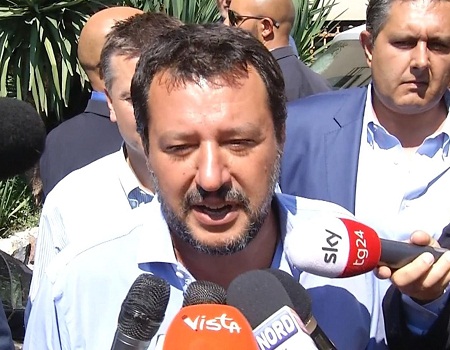
ITALIAN interior minister Matteo Salvini is reportedly under investigation over his refusal to allow migrants stranded aboard a ship in Sicily to disembark.
Seven women and six men have been let off the vessel at the orders of a doctor after almost a week stuck in the old port of Catania, but 137 remain on board as the government stands firm over its position.
The populist administration will not take the passengers ashore from the Diciotti coastguard ship unless other EU nations commit to taking them, prompting the United Nation’s refugee agency to implore other countries to take responsibility.
Filippo Grandi, UN High Commissioner for Refugees, advised European countries to “do the right thing” and aid the migrants “in their time of need”, but so far only Ireland and Albania have offered to take about 20 each.
ALSO READ: More than 100 migrants storm border of North African Spanish enclave
“European solidarity is important and this is the right thing to do,” the Irish foreign minister, Simon Coveney, said on Twitter.
Prosecutors have now opened an inquiry into Mr Salvini for “illegal confinement, illegal arrest and abuse of power”, according to Italian reports.
Mr Salvini appeared to confirm the report with a tweet directed towards the lead prosecutor, which said: “If he wants to interrogate me or even arrest me because I defend the borders and security of my country, I’m proud.”
Mr Salvini, who also serves as deputy prime minister and is the leader of the far-right League party, has taken a hard line against migration.
He had previously shrugged off reports that some of the migrants had gone on a hunger strike in a bid to force the government to allow them onto land, having been stuck in the port since Monday.
Before boarding the Diciotti on 16 August, the migrants were spotted on a human trafficker’s boat in the Mediterranean.
There had been 177 refugees on the vessel, but 27 teenagers were allowed to disembark in Catania on Wednesday.
Thirteen young children and ailing adults were previously evacuated.
All but 18 of those on the coastguard ship are Eritrean, while the others are from Somalia, Syria and Sudan.
They previously told authorities they had suffered months and even years of inhumane treatment in detention in Libya while waiting to leave aboard smugglers’ boats.





